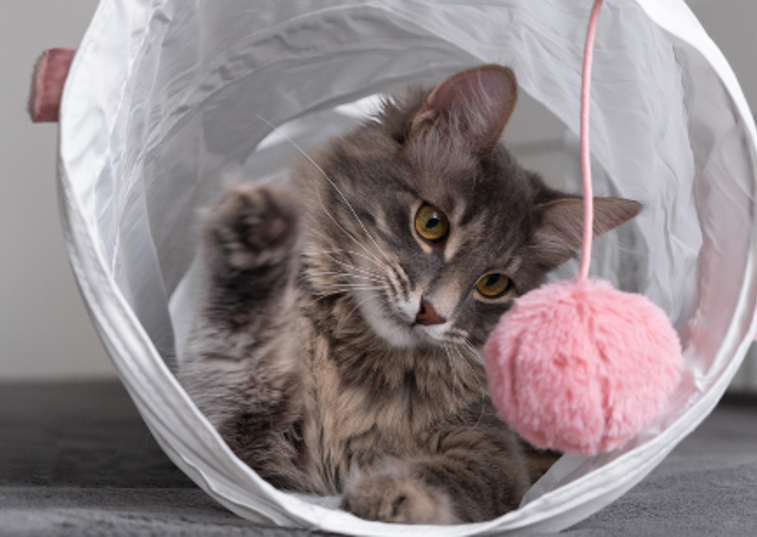As award winning pet insurance specialists we’ve designed 15 cover levels to give you the freedom to choose the right level of cover for you and your dog. Just click the options below to find out more.
What they lack in size, Yorkshire terriers certainly make up for in personality. These smart, self-assured pups come with oodles of attitude. Seemingly unphased by their size, these adventurous little dogs will happily give larger dogs a run for their money. And their feisty streak does mean owners need plenty of patience when it comes to training.
But at the same time, they adore attention and make friendly, affectionate pets that the whole family will love. Yorkies (as they are affectionately known), have a real sense of adventure and are wonderful companions.
Originally bred to catch rats in mills, Yorkies are lively and inquisitive. However, they don’t need a huge amount of exercise and are happy trotting around the house and garden.
If you think a Yorkshire terrier might be the right dog for you, this useful guide is packed full of information on how to look after your new pet. From common health problems to finding the best Yorkshire terrier insurance policy/dog insurance for your four-legged friend, we’ve got it covered.
We also answer any questions you have about costs.
For example: Are Yorkshire terriers expensive to insure?
And, how much does it cost to keep a Yorkshire terrier?
Is the Yorkshire terrier breed right for you?
Part of the ‘toy’ breed group of dogs, Yorkshire terriers are often referred to as ‘lap dogs’. If you’re looking for a dog you can make a fuss of, this breed is ideal. They simply can’t get enough attention.
Their spirited nature makes them good watchdogs. However, it can mean they are snappy at times.
If, for example, a young child isn’t treating them gently or with respect, they may retaliate. Plus, they can sometimes be aggressive towards other dogs. But generally speaking, most will cohabit peacefully with other household pets.
Keen to find out more? Here are some interesting facts and figures about the Yorkshire terrier breed. If you're looking to insure your Yorkie, take a look at our dog insurance page for more information.
Vital stats
Size: 20cm to 23cm; Toy dog breed category
Weight: 1.8kg to 3kg
Coat: Long; fairly high maintenance grooming
Exercise: 30 minutes a day
Life span: 12 to 16 years
Temperament: Smart, affectionate, and confident
Tendency to bark: High
Interesting facts about Yorkshire terriers
- Yorkies hardly shed at all and their hair never stops growing. It left unclipped, their coats could grow to two feet long.
- They can sound like geese. This is because they’re prone to pharyngeal gag reflex (aka reverse sneezing) which makes them gasp for air and honk, rather than expel air out.
- In the past, various Yorkshire terriers have held world records for being the world’s smallest dog: Sylvia (2.5 inches tall), Thumbelina (5.5 inches), and Big Boss (4.7 inches).
- Celebrity Yorkshire terrier owners include Audrey Hepburn, Paris Hilton, Simon Cowell, and Gisele Bundchen.
- A Yorkshire terrier named Smoky is thought to be the first ever therapy dog. Adopted by a soldier during World War II, Smoky would go round hospital wards lifting the spirits of injured soldiers.
Personality traits
Affectionate
At heart, this breed makes a wonderful companion enjoying pampering and known for being a ‘lap dog’ they do love a snuggle on the sofa. Happiest when with their owners, this breed would suit a family that spend a lot of time at home as they can suffer from separation anxiety.
Lively
A big bundle of fun in a small package, this tenacious breed is playful, active, and vigilant. Providing hours of energetic entertainment, this breed may suit someone looking for a dog to provide companionship and loyalty.
Intelligent
Yorkies love their owners and although sometimes bossy, their eagerness to please can allow them to learn quickly. However, consistency is required due to their sometimes-stubborn nature, if you have the time to spare, this could be a perfect companion.
Yorkshire Terriers at home
Quickly able to place themselves at the heart of the home, these affectionate and loyal dogs come with some high maintenance traits; These dogs require a lot of grooming, with a coat very similar to human hair this breed needs daily brushing along with weekly bathing. Being low shedders, this breed is perfect for someone who prefers a hair free home!
Self-assured and natural attention seekers, Yorkies have heaps of personality that is a joy to watch. Assertive, this breed is best suited to families with older children.
Hugely devoted to their owners it is easy to see why people fall in love with these dogs, if you are looking for a dog that will enjoy a relaxing afternoon on the sofa, this may be the breed for you.
Top care tips
- A full grooming kit is a must for this breed.
- This breed is not suitable to long periods of time alone, as can develop separation anxiety.
- Stubborn, consistent training is required for a confident yorkie.
- Yorkies are sensitive to cold so in the winter can benefit from a dog coat.
Common health problems in Yorkshire terriers
The majority of Yorkshire terriers live long and happy lives. However, there are some health conditions that this breed is more prone to than others. If you would like to find out which health conditions are covered within our dog insurance policies, visit our dedicated page for more information.
As a responsible dog owner, you need to ensure your pet stays as healthy as possible. This means regular visits to the vet, a happy home and a healthy lifestyle. Having a pet insurance policy in place could also provide peace of mind and help cover the cost of treatment if your dog should need it.
Here are some of the common health problems found in Yorkshire terriers.
Breathing difficulties
A collapsed trachea (windpipe) is a common condition in Yorkshire terriers. The tracheal rings – which create a clear airway – tend to be softer in Yorkshire terriers. If these rings collapse, the airway becomes narrow and causes breathing difficulties.
The most common sign of a collapsed trachea is a chronic, dry, honking cough that lasts more than a fortnight. Medication or surgery can treat the problem.
Preventative care includes keeping your dog at a healthy weight and using a harness rather than a collar when out for a walk.
Eye disorders
Dry eye, lens luxation and progressive retinal atrophy are all disorders affecting Yorkshire terriers’ eyes. If left untreated, they can cause permanent damage to the eye – or even blindness. Regular check-ups can help spot signs early on.
Hypoglycemia
If Yorkshire terriers become stressed or anxious, it can cause their blood sugar level to drop. In turn, this can cause weakness, confusion and instability. Signs that this is happening in your dog include shaking, lethargy and a blue tinge on the tongue and gums.
Look out for other symptoms, such as increased thirst, more frequent urination, increased appetite and weight loss. Medication can help manage the condition.
Lameness
Lameness can be caused by Legge-Perthes disease (affecting the hips) or a luxating patella (affecting the kneecaps) - two conditions that are common in thies breed. Both conditions are painful for your dog and surgery tends to be the best treatment.
Recovery after surgery for Legge-Perthes disease in particular can be slow and expensive involving lots of rehabilitation therapy. Having puppies insurance in place when your dog is still young will ensure coverage of hefty vet and rehabilitation bills.
Luxating Patella
If you notice your dog hopping on one of their back legs, they may be suffering from a luxating patella. This means that their kneecap is not sliding into the correct place, causing the leg to lock up. The kneecap will either stay there or continue to slide out of place. Your dog will be in pain and will become lame if not treated. To treat the problem, your dog will need surgery to correct the kneecap’s alignment.
History
The Yorkshire terrier was developed in Yorkshire, England during the Victorian era. The breed is thought to descend from several other terriers including the Maltese, black & tan Manchester, and Dandie Dinmont terrier as well as some breeds that are now extinct such as the Clydesdale terrier.
Other historical information about the breed is uncertain or conflicting. Some believe the dogs were bred by working men in Northern England who could not easily keep large dogs yet wanted a feisty companion. Other reports say the Yorkie was developed for catching rats that infested mine shafts and as a dog to enter badger and fox burrows. Yet another theory is that Scotsmen working in Yorkshire wool mills developed the breed.
The original Yorkshire terriers were larger than those of today. Through selective breeding, the dogs were miniaturised and became a dog that was fashionable to own. Today, the Yorkie is primarily a pampered companion and lapdog.
Want to find out more about our Yorkshire Terrier Insurance/Dog Insurance Product?
We’ve listed our key benefits below and you can also take a look at our cover levels, customer reviews and awards.
Ready to get started? Click here to get a quote.
Why choose Purely Pets
Free 24 hour Vet Helpline for all customers
There’s no upper age limit
Easy online claims process
Payments made direct to vet
15 levels of Lifetime cover
Lifetime Cover up to £15,000
Flexible Excess Options
Manage your policy online
Award winning Pet Insurance
How to care for your Yorkshire terrier
Looking after any pet takes time, patience and commitment. You need to make sure your Yorkshire terrier is eating a healthy diet, getting the exercise it needs and doesn’t develop any behavioural problems.
Here’s what you need to know to keep your Yorkie looking and feeling in tip-top shape.
Feeding your dog
A Yorkshire terrier puppy will need to be fed three to four times a day. An adult - twice a day. Information about portion sizes can be found on the dog food packaging, but if you are unsure, just ask your vet.
Yorkies may think they’re pretty tough, however they do tend to have sensitive stomachs. Before welcoming a pup into your home, find out what they are currently eating and stick with the same food to avoid an upset tummy.
Does your dog require a special diet? Take a look on our dog insurance page to see if you may be covered for certain expenses related to your dog's diet.
Grooming your dog
With their long, flowing coats, a Yorkshire terrier needs plenty of grooming. Regular brushing and trimming are essential to prevent hair from matting. A monthly bath will also help keep the coat in good condition.
This is something you can do yourself or ask a professional dog groomer to do for you.
Exercising your dog
Yorkshire terriers don’t need as much exercise as bigger dog breeds, but they still love to tear around in wide, open spaces. Whether that’s playing chase, learning new tricks or taking part in agility trials, exercise will keep your dog occupied and entertained.
Check out our ultimate guide to walking your dog for some handy ‘walkies’ tips.
Training your dog
Yorkshire terrier puppies are notoriously difficult to toilet train. That’s partly because when they do have an accident in the house, it’s generally very small and easy to clean up. As a result, owners may let it slide.
When they get it right, reward them with treats. And with a little time and patience, they will get it.
Overall, Yorkies are very receptive to training and are more than happy to learn new tricks, perfect their agility (and enjoy lots of praise and attention in the process).
Some Yorkshire terriers can be a bit ‘yappy’, barking at every sound they hear. Be sure to start training them not to bark from a young age, being firm and consistent so they understand who is in charge; make sure they know who’s top dog!
Of course, all dogs bark as a way to communicate. Learning your dog’s different types of barks will help you better understand why they are barking in the first place and how you can reduce the frequency.
The Purely Pet Promise
At Purely, we’re here to support you. That’s why we offer a 24 Hour Vet Helpline free of charge to all of our customers. Our easy to use online portal ‘Manage My Policy’, enables you to access to your policy 24hrs a day. This provides greater flexibility, allowing you to manage your policy at a time that suits you, so that you can spend more time with your furry friends, and less time managing your insurance. Get a quote
Our Dog insurance cover levels

For your dog

For your dogs, for your cats or for both
How much does Yorkshire terrier pet insurance cost?
There is a financial responsibility you must meet as a dog owner which extends beyond the Yorkshire terrier insurance cost. First up, you’ve got to buy a puppy (or make a donation to an adoption centre).
How much is a Yorkshire terrier in the UK? It can range from between £1,200 to £2,000, according to pet classified site, UKPets.
Then, you’ve got the cost of keeping a Yorkshire terrier, including doggy equipment. That means a lead, collar, harness, dog bed, grooming brush, toys and doggy toothpaste and toothbrushes.
You also need to add the cost of food, boarding kennel fees (if you go away on holiday and can’t take your dog with you), training costs, and doggy day care (if other commitments mean you’re not able to walk your pooch as much as needed).
Plus, there’s the vets bills. Preventative treatment (jabs, worming and neutering) are generally not covered in a pet insurance policy. But if your dog were to develop an illness or was injured and required medical attention, arranging a pet insurance policy could help provide peace of mind.
And as any dog owner will tell you, vets’ bills can soon add up.
How much does Yorkshire terrier pet insurance cost? Perhaps less than you think. Investing in pet insurance for a Yorkshire terrier can be cost-effective for a number of reasons.
Firstly, Yorkshire terriers are one of the least expensive dog breeds to insure. Plus, smaller dogs tend to have smaller vets bills (and eat far less each month than their larger cousins).
If you’re looking to protect your Yorkshire Terrier simply get in touch with the team at Purely Pets. Our experts can help you find specialist pet insurance to meet the needs of you and your dog.
Get your free quote and apply for cover today.
Types of insurance for Yorkshire terriers
When it comes to small dog insurance, there is no one-size-fits-all solution. Yorkshire terrier pet insurance plans come in different shapes and sizes.
There are four main types of insurance for dogs:
Lifetime pet insurance
This is the highest level of insurance on offer, and one that will cover a range of health conditions over a 12-month period. For each condition, there will be a limit on how much you can spend on treatment per year.
However, as long as you renew the same insurance policy, that figure will reset every 12 months.
Maximum benefit pet insurance
With this type of insurance policy, you can spend up to a fixed amount on a particular condition. Once you have reached the limit for that condition, you can no longer claim for further treatment. Even if you renew the policy, you will have to cover those costs yourself.
Time limited pet insurance
As the name suggests, this type of insurance policy covers you for one year only. If you reach the policy limit sooner than that, your pet will no longer be covered. And if you need treatment for more than 12 months, you will not be able to claim against the policy.
Accident only pet insurance
Again, the name of this insurance policy is fairly self-explanatory. Your pet will be covered if they are injured in an accident, but they will not be covered if they develop an illness or health condition.
If they do develop symptoms and require veterinary treatment, you will have to pay for that yourself.
Customer reviews
We’re committed to improving our Pet Insurance products wherever possible, which is why feedback from our customers is so important to us. We’re incredibly proud of our Excellent Trustpilot rating and you can read the latest reviews from our fantastic customers below.
Pet advice & news

Should you spay or neuter a kitten? Simple facts every pet parent must know
09/07/25
Should I spay or neuter my kitten? Did you know that a female cat can have up to 18 kittens in a single year? This staggering reproductive capacity is why most veterinarians strongly recommend spaying or neutering your kitten.

Can dogs eat broccoli and other vegetables? A simple yes/no list
04/07/25
As loving pet parents, we're constantly seeking ways to keep our furry companions healthy, happy, and thriving. One question that often crosses our minds is, "Can dogs eat broccoli and other vegetables?" It's no secret that these nutritious greens do wonders for our bodies, but can they provide the same benefits for our canine friends?

Are cat tunnels good for cats?
30/06/25
Do you ever wonder if cat tunnels are good for your furry friend? Well, guess what? You've come to the right place! Cat tunnels can be a fantastic addition to your cat's life, providing them with both physical exercise and mental stimulation.
Find out more
You can find out more about our Dog Insurance product below and there’s more help available on our FAQs page.
Along with other flat-faced breeds like pugs, French bulldogs have a low life expectancy compared to other canines. It's most likely due to their increased risk of breathing issues, skin infections and other common health problems.
Insuring them from the moment they become part of your family means you can get them the care they need for a happy and healthy life.
Yes, compared to many other pedigree dogs, French bulldogs are quite high risk because of the various predisposed medical concerns they face.
French bulldogs can cost a bit more than others breeds to insure, but the exact amount you pay will depend on things like:
- The type of policy you choose
- How much protection you need
- How old they are
- How healthy it is
- Whether it's been spayed or neutered
- Where you live
- The amount of excess you choose to pay
At Purely Pets, we only offer lifetime plans for your French bulldog to get the best protection. Choose from 15 levels of insurance to find one that fits your needs and budget.
If the cost of insuring your French bulldog is making you think twice about getting protection, there are a few ways you can save on your premiums:
- Increase the amount of excess you pay when you make a claim.
- Choose to insure multiple cats and dogs with us.
To find out how much you could save by taking these steps, get in touch with Purely Pets today.
French bulldog owners want only the best for their four-legged friends. A lifetime insurance policy provides ongoing protection against health issues and injury year after year, making it the most comprehensive cover and best option for your pup.
There are no limits to how many injuries and illnesses you claim for, as long as they apply to your policy and don't exceed the annual monetary limit of your plan.
Despite their name, Frenchies were first bred to be lap dogs in England. They were created as small versions of the British bulldog and made excellent companion dogs.
They joined English lacemakers on visits to France, where they soon picked up their new moniker and became the breed we now know and love.
Yes! Frenchies love being around people and they can suffer from separation anxiety if left alone too long. Their affectionate and playful personality means they'll get along with everyone, from toddlers to grandparents, and they're also extremely loyal to their owners.
As long as you spend some time training your Frenchie (especially when they're young), they are usually well behaved. It's important you get to know your four-legged friend well to spot any signs of behavioural problems and get professional help before they get any bad habits.
Like all canines, French bulldogs bark, but they aren't known for excessive barking. If yours does start to be more vocal, it might be because something's making them excited or nervous.
If you're looking for a dog that doesn't leave hairs everywhere they go, French bulldogs are a great choice. To minimise shedding, bathe them every couple of months and brush their fur once a week or two.
Simply sign up online and we'll email you a unique link. Share this link with your friend, and when they become a customer, you both get £15 in the form of an Amazon voucher or PayPal credit!
Once your friend has signed up using your unique link, we'll wait 60 days for their policy to be in force and then send you an email to confirm and select the reward you want. It couldn't be easier!













